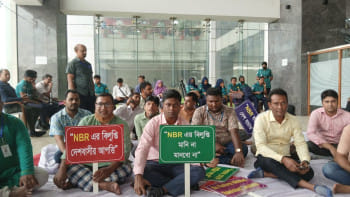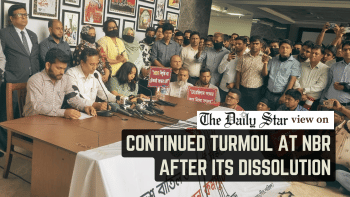NBR crisis is the result of institutional egos clashing

"As a young civil service officer, I never imagined I would have to take to the streets to defend my professional career," an income tax cadre official told me on the first day of the indefinite shutdown at the National Board of Revenue (NBR) headquarters. "Refraining from my official duties and standing in protest wearing a badge, under the adverse weather—this was never what I signed up for. But we have been pushed into a corner. There is no other way," said the official, who travelled from outside Dhaka to join the "March to NBR."
As of Sunday, the second phase of the protest entered its sixth day, under the banner of the NBR Reform Unity Council, a platform created by the protesters. Following four consecutive days of pen-down and sit-in programmes, the protesting NBR officials enforced a complete shutdown starting Saturday.
The first phase of the protest ran from May 14 to May 25, while the second phase began on June 23. The situation had started to simmer down after the Eid-ul-Azha holidays after the first round of protests as the officials received assurances regarding their demands from the government. However, a recent transfer order involving some protesting officials, coupled with restrictions on the use of the NBR conference room for meetings and the deployment of law enforcement members, rekindled tensions and reignited anger within the tax administration.
The mistrust between the senior leadership, particularly the NBR members, and the lower-tier officials, who are mostly protesting, has only deepened the crisis. When Finance Adviser Dr Salehuddin Ahmed called a meeting with the NBR officials on Thursday, only 16 members attended instead of the protesters; the protesting officials boycotted the meeting saying they did not get any "official invitation."
A day later, the finance ministry said the NBR protesters had agreed to withdraw the shutdown programme. But just hours after that announcement, the NBR Reform Unity Council dismissed it and reaffirmed their commitment to continue the protest.
It was a complete misstep on the government's part to handle such a critical issue while ignoring the protesters.
In addition, the government again said a follow-up meeting had been scheduled for Tuesday [July 1], aiming to discuss the Revenue Policy and Revenue Administration Ordinance, 2025, based on the finance ministry's earlier press release issued on May 25. In its statement, the ministry also said the authorities would review the transfer orders of the five officials.
In this turmoil, however, neither side showed any attempt to find a solution to the ongoing stalemate.
On Saturday night, the finance adviser told Prothom Alo, "I have scheduled a meeting with them (the protesters) on July 1. But the condition is that they must withdraw their movement before attending.
"If they want to meet earlier, I am open to that too. I hope they (the protesters) will come to their senses. They must prioritise the interest of the country. Revenue collection must not be disrupted," he further added.
The protesters, meanwhile, signalled their willingness to sit for talks, but insisted on the NBR chairman being removed from his post beforehand.
On Sunday, the government issued another statement urging the protesters to withdraw from "activities against the law and against national interest," warning that it would be forced to take a tough position otherwise. As of 6:20pm, the protesters did not make an announcement of ending the shutdown.
However, the ongoing shutdown has truly cut through the noise. At a time when the state is counting every crore to manage a strained budget, this standoff between government high-ups and the revenue officials has laid bare the high cost of delayed dialogue, deep-seated bureaucratic mistrust, and bruised institutional egos.
This is no ordinary administrative dispute. This is a paralysis at the very nerve centre of Bangladesh's revenue system—one that underwrites over 88 percent of the national budget. With June being the peak month for collections, contributing nearly Tk 58,000 crore last year, each passing day of disruption bleeds the economy and deepens uncertainty in trade and business.
When revenue officials go on strike, containers pile up at the ports, raw materials stay locked behind paperwork, exporters miss deadlines, and small businesses suffer cash crunches. Yet, the silence from both policy bureaucrats and the officials on strike has persisted for days, each waiting for the other to blink.
In a joint press conference on Saturday, the country's top businesses, including industry leaders from apparel, pharmaceuticals, leather goods, textiles, and accessories, raised alarm over the mounting financial losses and operational gridlock caused by the NBR shutdown. They warned that prolonged disruption would have serious economic consequences for Bangladesh.
For instance, the RMG sector alone is facing trade disruptions worth more than $230 million per day as the movement of goods and raw materials through Chattogram port, land ports, and airports remains stalled due to the shutdown by revenue officials. One business leader remarked that customs operations are never halted except in times of war.
In this situation, one might argue that the protesting officials are holding on to their egos. But while they stand firm, it is the economy that suffers and ultimately, it is the people who pay the price for this prolonged stalemate.
And that raises a fundamental question: why should ordinary citizens bear the burden of a bureaucratic breakdown? This is not a crisis that belongs in the streets. It belongs at the negotiating table where mature dialogue, not institutional ego, should lead the way. If the government and the protesters truly care for the country and not just their institutional ground, then they must speak, listen, and act so that this stalemate is resolved as soon as possible.
Md Asaduz Zaman is a business journalist at The Daily Star. He can be reached at [email protected].
Views expressed in this article are the author's own.
Follow The Daily Star Opinion on Facebook for the latest opinions, commentaries and analyses by experts and professionals. To contribute your article or letter to The Daily Star Opinion, see our guidelines for submission.

 For all latest news, follow The Daily Star's Google News channel.
For all latest news, follow The Daily Star's Google News channel. 











Comments